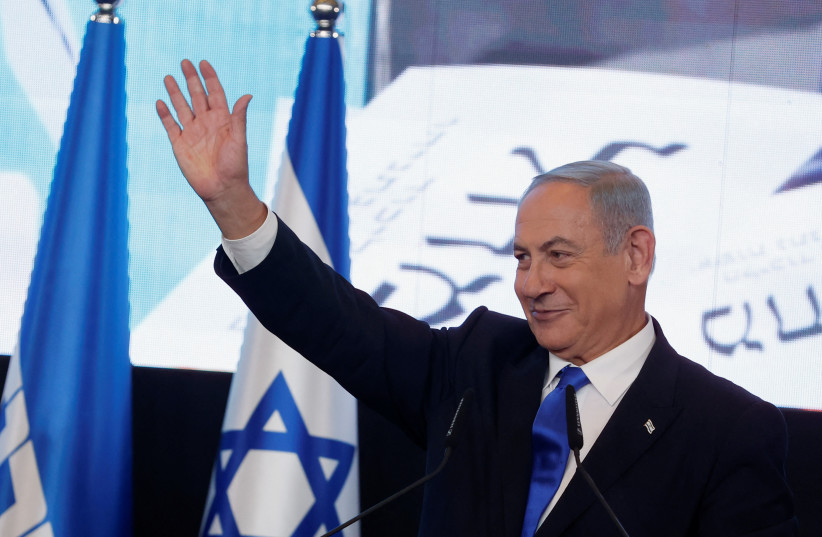By returning to power, the Jews returned to history. The conversation about this historical Jew-Jitsu usually emphasizes Israel’s military power to defend its borders and the Jewish people’s ongoing powerlessness to eradicate Jew hatred worldwide. In resurrecting the minor festival of Hanukkah, Zionists often celebrated our power to defeat our enemies at home and abroad.
But this Hanukkah, the Hasmonean dynasty the Maccabean revolt spawned should spotlight another dimension of Jewish power, especially as Benjamin Netanyahu forms his grubby grabby government: the Zionist revolution returned Jews to self-governance.
The Zionist analysis
The Zionist analysis was simple: if defeat, destruction and dispersion caused oppression, we needed to return home, rebuild and restore our power. Most Zionists accepted the Herzlian alchemy whereby a robust liberal-nationalist revolution would liberate the Jewish body and the Jewish soul, to help ourselves and humanity. As Herzl wrote in Der Judenstaat (The Jewish State), his 1896 Zionist manifesto: “We shall live at last as free people on our own soil and in our own homes peacefully die.” Fulfilling that particularist dream, catalyzed by Jewish values, would do universal good, “The world will be liberated by our freedom, enriched by our wealth, magnified by our greatness.”
Herzl’s rival, Ahad Ha’am, scoffed. He identified the “secret of our people’s persistence” as the Prophetic teaching to respect only spiritual power, not material power. A “political ideal which does not rest on the national culture” – meaning Jewish ethics – will “seduce us from our loyalty to spiritual greatness... thus breaking the thread that unites us with the past.”

This concern was particularly pressing because Ahad Ha’am dismissed “those Western Jews” like Herzl “who have long since almost forgotten Judaism” but dominated the Zionist movement. Ironically, today, supposedly-devout ultra-Orthodox Israelis’ lust for power threatens Israel’s soul, repudiating the prophetic tradition.
True, the government remains unformed. And Israel is bigger than any one politician or coalition. Nevertheless, the warning signs keep multiplying. Last week’s spectacle of personal bills passing their first Knesset reading was dismaying. If this Knesset will pass an Itamar Ben-Gvir Law and Arye Deri Law, why not pass a Gil Troy Law, too?
I wish I could bypass some annoying laws – and I am a model citizen, certainly compared to these people. I have never been arrested, I have never bullied my fellow Arab citizens and I have never served time for bribery, fraud or breach of trust, nor slimed out of a plea deal for tax offenses.
This embarrassingly-low bar regarding character is apparently the new Knesset’s standard. Even worse, these private, curated, legislated power grabs reflect a greedy, arbitrary and undemocratic abuse of power. True, parliamentary systems don’t enjoy America’s checks and balances. Inspired by Baron de Montesquieu, America’s founders understood that concentrating power crushes freedom, even if that power is voted in legitimately.
“ALL WOULD be lost,” Montesquieu warned, if any one leader or governmental body “exercised these three powers: that of making laws, that of executing public resolutions and that of judging crimes or disputes between individuals.” Without independent institutions with their own authority and mission, it’s too easy to make tyrannical laws to be carried out tyrannically.
Benjamin Netanyahu’s ideological godfather, Ze’ev Jabotinsky, echoed Montesquieu’s teaching. To distinguish between democracy and tyranny, Jabotinsky taught the individual must be sovereign, with the state’s power to limit individual freedom only exercised when absolutely indispensable.
It’s “not exactly true that democracy blindly identifies with majority rule,” Jabotinsky preached. Democracy misfires if “the minority, i.e., 49 equal kings out of 100, or 10, or even one out of 100 should feel themselves enslaved.”
Netanyahu has endorsed the rule of law, separation of powers and minority rights – in English. But these half-hearted reassurances have been drowned out by the bleatings of political pigs slopping up whatever powers and goodies they can from the public troughs. They seem to be following the simple formula Netanyahu articulated in his memoir: “Power attracts. Weakness repels.”
Beware, power repels, too, when politicians dismiss checks and moral limits as weaknesses. As Jabotinsky said, “In an ideal state, compromise between the majority and minority should be a permanent rule.”
Netanyahu is not only being tried in a court of law, as his lawyers drag out his trial and he is not only being judged in the court of public opinion, which remains deeply divided about him. He is also being appraised by the bar of history.
His memoirs chronicle all he has done to save Israel’s body, from resisting Iran and Palestinian terrorism to negotiating the Abraham Accords. But history will not forgive him if he leaves Israel’s body politic shattered or Israel’s soul scarred.
Rather than distorting the Maccabean tale to deem the sword mightier than the word, the incoming coalition should study the Hasmonean dynasty’s subsequent fall. Fusing civil power with religious power, petty infighting, spiteful revenge and rank corruption weakened the Jewish people’s spirit. That degeneration made it easier for conquerors to conquer.
Instead, appreciate Hanukkah’s Haftarah, Zecharia 2: Live “not by power but by spirit.” Read Theodor Herzl’s classic short story The Menorah – that the Zionist revival is outward looking – like the hanukkiah in our windows, but it illuminates inside our homes too. Only by balancing internal and external strength will the darkness defeat the light.
Remember, democracies elect temporary leaders to represent the majority, no matter how slim, but leaders must protect the minority, meaning every citizen, too. A government that only serves an election’s winners is ultimately governed by losers.
The writer is a distinguished scholar of North American history at McGill University and the author of nine books on American history and four books on Zionism. He is the editor of the new three-volume set Theodor Herzl: Zionist Writings, the inaugural publication of The Library of the Jewish People (www.theljp.org).
